Books
In Advance Of The Landing
Back in 1977, photographer Douglas Curran began taking photos of objects built by people in anticipation of the arrival of extraterrestrials. Eight years later, he collected these photos together in his book In Advance of the Landing: Folk Concepts of Outer Space.He said the following about the book in a 1982 interview (Popular Photography - Nov 1982):
Curran was asked how the people he photographed received him. Were they suspicious or secretive? He replied that they were open to him.
"I arrive on their doorstep," he said, "tell them my name, and explain that I heard about their work and want to talk to them. They're usually surprised that somebody from so far away heard about them. Also, they feel I'm ordained to do this. I've become great friends with many of them."
I haven't had a chance to read the book, but it seems like it belongs in any library of weird reading material. You can get a copy either via Curran's website or from Amazon.

Curran also made a documentary film of the same name that he released in 1993.
Posted By: Alex - Sun Jun 04, 2017 -
Comments (5)
Category: Aliens, Books, Documentaries
Looking Forward to Being Attacked

In 1977, Lieutenant Jim Bullard of the Memphis police department published a self-defense manual for women titled Looking forward to being attacked. The general theme was that if a bad guy attacked you, it gave you the chance to beat him up, which could be fun. His idea was to use some humor to make the self-defense lessons more interesting.
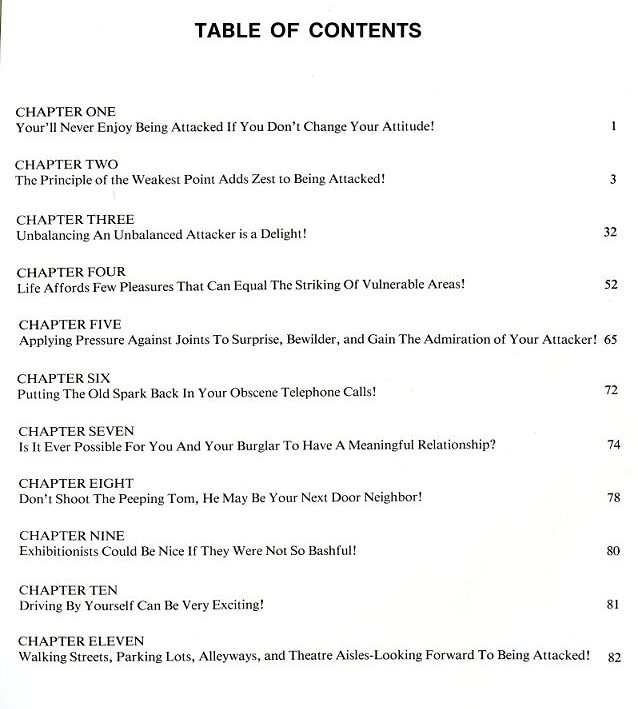
Some of the self-defense tips from his book:
- If you're grabbed, don't scream. Even if he didn't intend to hurt you, it'll be an automatic reflex to shut you up.
- If he grabs for your purse or any personal belongings, let them go. Defend personally. Don't defend property.
- Don't try to kick, scratch or punch him. Instead, through the principle of attack the "weakest point" you can escape 90 percent of the time.
- If you have a chance, jab any sharp object including your thumb into his trachea — his adam's apple. That is a man's most vulnerable area.
- One hundred and fifty pounds of pressure will kill a person. Seven pounds of pressure is all anyone can comfortably stand.
- The ears are the second most vulnerable area. Slap your hands against them.
- The eyes are the third choice and always carry your car keys when going to your car in a dark parking lot. If you can, scrape them across the assailant's eyes. Use a ball point pen, if you have it out of your purse.
- A fourth choice, especially when held around the waist from behind, is to reach back and strike at a man's testicles.
- If you find a burglar is outside your home, warn him first, and then you can take a cannon and blow him into the next county. 99.6 percent of the time you scream when someone's outside, warn him, he'll run. If he doesn't, you can legally assume he's coming in to kill you. A shotgun is the most efficient weapon. Kill him. You're doing society a favor when you do do it. I've seen those that didn't do it, and it's a very sad case.
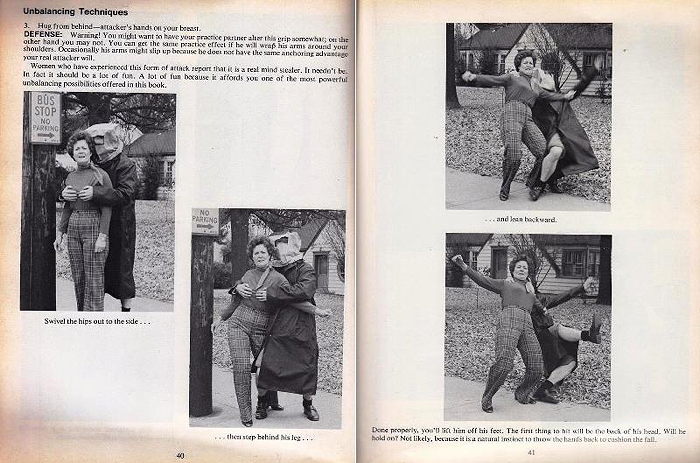
More images at Awful Library Books.
Posted By: Alex - Sat Apr 29, 2017 -
Comments (1)
Category: Martial Arts, Books, 1970s
Historic Book Odour Wheel
Noting that "the role of smells in how we perceive heritage has not been systematically explored until now," researchers at University College London have developed a "Historic Book Odour Wheel."They tested it on visitors to St Paul's Cathedral's Dean and Chapter library in London, who characterized the smell of the library as 'woody,' 'smoky,' 'earthy,' and 'vanilla.'
The researchers say, "the Historic Book Odour Wheel could potentially be used to recreate smells and aid the design of olfactory experiences in museums, allowing visitors to form a personal connection with exhibits by allowing them to understand what the past smelled like."
More info: Science Daily, Heritage Science

Posted By: Alex - Wed Apr 12, 2017 -
Comments (3)
Category: Science, Books, Perfume and Cologne and Other Scents
How I Stole Elections

Marlin Hawkins served as an elected official in Conway County, Arkansas for 38 years — for most of that time as sheriff. He built up a legendary political machine, being able not only to win reelection for himself (19 times) but also to deliver votes for other candidates. He often boasted that he could accurately predict the outcome of every election in the county.
It was long suspected that he was rigging the elections, especially since absentee voters would always vote for him by a wide margin, but no one could ever prove anything.
After he retired in 1978, Hawkins eventually wrote his autobiography, which he brazenly titled How I Stole Elections (available on Amazon). He joked that he "stole" them by "treating my neighbors right."
But no, he stole them by ballot fraud.
His book came out in 1991. The year after, some people who were remodeling their house discovered a whole stash of marked ballots from a 1968 election hidden in their attic. The house had previously been owned by one of Hawkins' deputies.
Hawkins got away with it because the statute of limitations had expired in 1974. He died in 1995.
More info about him at the Encyclopedia of Arkansas.

Palm Beach Post - Jan 9, 1992
Posted By: Alex - Thu Mar 09, 2017 -
Comments (3)
Category: Government, Politics, Books, 1990s
Wonderful Ching-Ching

Additional images and full PDF download here.
Posted By: Paul - Mon Jan 09, 2017 -
Comments (3)
Category: Stereotypes and Cliches, Books, Asia, Europe, Nineteenth Century
Your Feet Are Killing You
In his 1953 book Your Feet Are Killing You, Dr. Simon J. Wikler expounded his theory that just about every medical problem one could imagine (cancer, allergies, tooth decay, etc.) was caused by shoes. His solution was to go barefoot. Ideally all the time.His theory was summarized in The Quarterly Review of Biology (Dec 1954):
The chain of events leading to the development of these diseases is described as follows. The modern shoe deforms the human foot, causes the muscles to shrivel, and leads to foot imbalance. Even the feet of infants are distorted because they are firmly tucked in under blankets or covered by tight stockings. Upon bearing weight, the deformity of the feet leads to a rolling out of the legs that carries the femora into external rotation. This deprives the pelvis of its anterior support, and allows it to dip downward in front. The spine is therefore forced into exaggerated curves, so that the abdominal space is reduced and the chest cavity is compressed. The vital organs and the blood vessels and nerves are displaced or abnormally stretched. The abnormal stresses lead to cancer of the breast, stomach, prostate, and uterus. To substantiate his thesis the author offers case histories and statistics. In addition to the development of this concept, the writer uses the latter part of the book to enumerate some foot ailments and to describe briefly the symptoms and treatment.
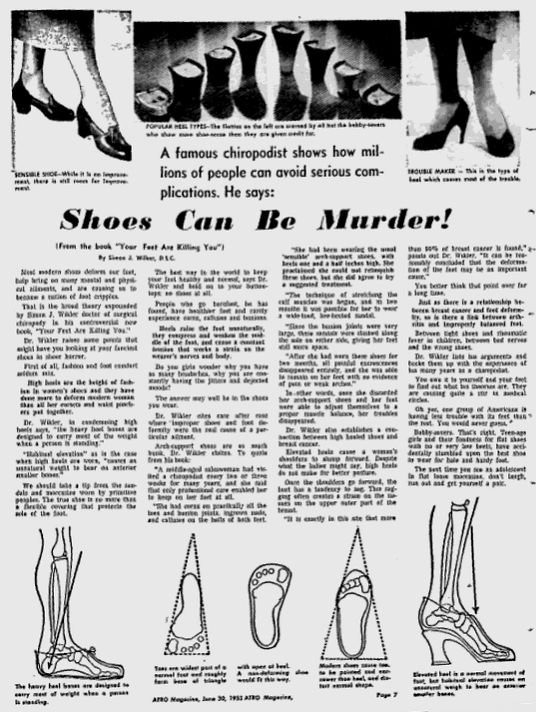
Washington Afro-American - June 30, 1953
A 1979 book by T.O. "Tip" Berg echoed Wikler's title, but added the word "literally" to give it even more dramatic emphasis:
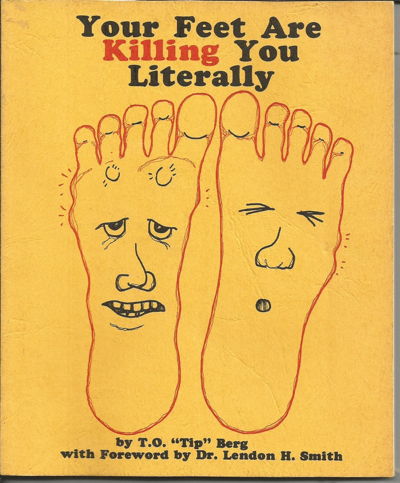
Posted By: Alex - Tue Dec 27, 2016 -
Comments (4)
Category: Books, Shoes, Diseases, Feet
Special Chinese Kid’s Book

Who could resist spending $57.40 plus $10.00 shipping for a book with this description:
Turtle with a small purple alien friend scientific expedition. Crossing the Sea like Crossing the Sea two stories travel the world. Little Turtle purple alien with friends explore the ocean together. they saw the beauty of the Great Barrier Reef. but dangerous whale is near! Little purple alien turtles have a friend who has a cool graduated spaceship! Spaceship. turtles and small purple alien friends a series of scientific adventures. They leap into space. understanding the mystery of the eight planets; they cross the center of the earth. after a dangerous volcanoes . But not all smooth sailing expedition. when they go to sea. but accidentally be swallowed into the stomach.
Item is here at time of posting.
Posted By: Paul - Fri Dec 02, 2016 -
Comments (3)
Category: Confusion, Misunderstanding, and Incomprehension, Books, Asia, Mistranslations
The odds of writing Paradise Lost…

For anyone planning to attempt this, John Venn (the guy who invented Venn diagrams) helpfully calculated the odds in his 1888 book The Logic of Chance.
The odds come out to 1 in 26350,000. In other words, not impossible. So start picking those letters!
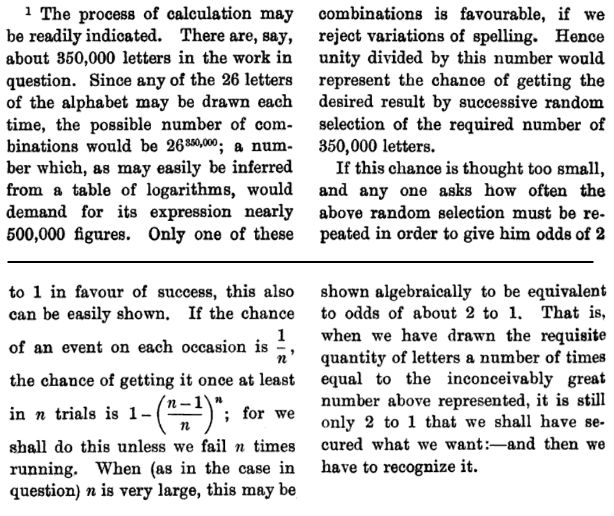
Posted By: Alex - Fri Nov 11, 2016 -
Comments (2)
Category: Literature, Books
Moby-Dick?
One of the great mysteries in American literature is the title of Herman Melville's 1851 novel, Moby-Dick. Or is it Moby Dick? Should the title be hyphenated, or not?The first American edition had a hyphen in the title. But confusingly, inside the book the whale was referred to as Moby Dick, without a hyphen — except for one single time, on page 609, when the name was hyphenated because it spanned two lines.
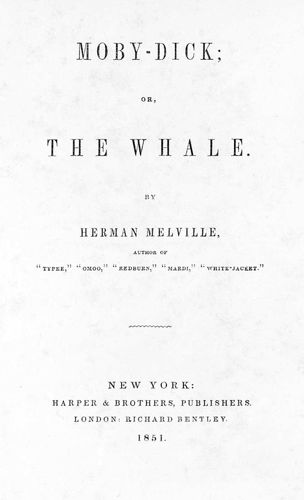
There have been many subsequent editions. Some of them have a hyphenated title. Some of them don't. It seems to be totally random. But because that first edition had a hyphen, scholars consider that to be the correct spelling. So the title of the book is Moby-Dick, but the name of the whale is Moby Dick.
But why the hyphen? There's a number of theories. Perhaps Melville just liked hyphenated titles. One of his earlier works, White-Jacket, was also mysteriously hyphenated.
Or perhaps the hyphen was a mistake. Supporters of this theory note that the title was changed at the last minute, from The Whale to Moby-Dick, and the title change was communicated to the printer by Melville's brother, Allan. So maybe Allan made a mistake, and it was never Herman's intention to hyphenate the title?
We'll never know. It'll always be one of those mysteries that literary scholars love to debate. (such as here, here, and here).
Posted By: Alex - Mon Oct 17, 2016 -
Comments (3)
Category: Literature, Books
Lou Bunin’s ALICE IN WONDERLAND
It's harder to be more surreal than the original, but this mixed live-actor stop-motion version by Lou Bunin tries hard.
Posted By: Paul - Sat Sep 24, 2016 -
Comments (0)
Category: Surrealism, Books, Fantasy, Stop-motion Animation, 1940s

| Who We Are |
|---|
| Alex Boese Alex is the creator and curator of the Museum of Hoaxes. He's also the author of various weird, non-fiction, science-themed books such as Elephants on Acid and Psychedelic Apes. Paul Di Filippo Paul has been paid to put weird ideas into fictional form for over thirty years, in his career as a noted science fiction writer. He has recently begun blogging on many curious topics with three fellow writers at The Inferior 4+1. Contact Us |




